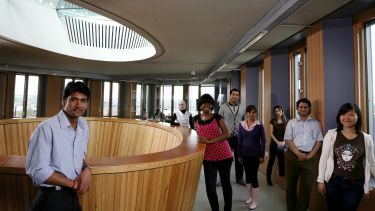Arts and humanities are essential for society
From global leaders to drivers of change, Arts and Humanities graduates leave University prepared to take on the challenges of tomorrow.

There is a vast amount of research evidencing the need for Arts and Humanities graduates due to their impact on society. From issues of climate change; social, political and economic policy; the rise of technology; global unrest, the list is extensive. Here are just a few recent reports on the topic.
The new Oxford University report, ‘The Value of the Humanities’, concludes that humanities graduates leave university with the skills and experiences to embark on impactful careers:
"Their degree has enabled them to make an essential contribution to addressing the major issues facing humanity, and informed their sense of public mission and commitment. This includes navigating “fake news” and social media manipulation; climate change; energy needs; and the ethical implications of Artificial Intelligence." [University of Oxford, ‘New research shows how studying the humanities can benefit young people’s future careers and wider society’, read the full report]
The skills graduates have that equip them to tackle the issues we face, means some even go on to secure some of the leading roles in our global economy and society:
55% of global leaders are Arts & Humanities and Social Science graduates
The British Academy
‘Understanding the career paths of AHSS graduates in the UK and their contribution to the economy’
This is further evidenced by a report produced by The Higher Education Policy Institute (HEPI). The report aims to counter the idea that Arts and Humanities graduates are less economically viable than those graduating from other degrees. The report demonstrates how Arts and Humanities graduates don’t only manage to secure jobs, they have access to meaningful careers which enrich both society and them as individuals:
"They equip students for success in the world of work – unequivocally so. But they also Improve quality of life, enhance society, and produce informed and engaged citizens. Education is not a zero-sum game, forcing students to choose between economic security or cultural enrichment. The arts and humanities offer both." [The Higher Education Policy Institute, ‘The arts and humanities: rejecting the zero-sub game’, read full report]
The very nature of Arts and Humanities degrees means that graduates have a fundamental understanding of how society functions, thus equipping them with the skills to learn from the past and embrace the new challenges we face. The British Academy delves into the importance of Arts and Humanities graduates for the future:
These subjects give us the tools to examine and explain human behaviour, understand how society functions, learn from the past and apply those lessons to the present, and analyse the drivers and implications of a changing world and how different countries, places and cultures interact.
The British Academy
‘Qualified for the Future: quantifying demand for the arts, humanities and social science skills’
AI is of course at the centre of conversation, policy and technological innovation. Whilst there has been a historic tendency to divide activities into those associated with STEM subjects from those that explore human existence, this must be addressed in order for AI to advance in a socially legitimate manner. UK Research and Innovation explain why input from Arts and Humanities graduates is essential in order for AI to develop responsibly:
"As the philosopher and theologian Hans Jonas observed a half century ago, modern societies stand astride a perilous breach between innovation and wisdom; between power and responsibility. If we do not act quickly to bridge it, AI could make that widening breach an insurmountable divide." [UK Research and Innovation (UKRI), ‘How the arts and humanities are crucial to responsible AI’, read full report]
